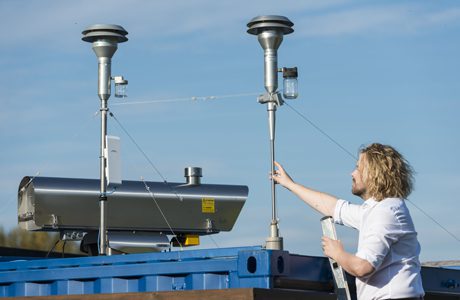
In late December the University of Brighton set up a £250,000 advanced air quality monitoring station, said to be the first of its kind in the UK dedicated to the detection of harmful nano-sized particles and their gaseous precursors.
Brighton MP Caroline Lucas officially opened the station on Friday 18 December and praised the university for its “trailblazing” research. “One of the lessons I have learned is that although air pollution quite often is invisible it really is a massive problem. It is responsible for literally thousands of premature deaths.”
She congratulated the University of Brighton for “breaking new ground and showing real leadership”.
She said: “What will come out of this research I hope will be more pressure on policy makers to take more action to reduce air pollution. I hope the university’s research will accelerate moves to improve air quality and “tackle this scourge on people’s health”.
Who is running it and why?
The university’s Air Environment Research (AER) team believes the station, on the Falmer campus, will “push the boundaries of our capabilities and enhance our understanding of the harmful air pollutants that we breathe”.
The station was funded by the Interreg IVB NWE programme and the University of Brighton as part of the Joint Air Quality Initiative (JOAQUIN, www.cleanerairbetterhealth). It comprises part of a wider “next-generation” monitoring network spread across North West Europe.
The AER team will use the station to investigate a range of modern day air pollutants, including so called “ultrafine particles”, nanometer-sized material suspended in the air that is capable of penetrating deeply into the human body where it can cause a range of negative health effects.
Dr Kevin Wyche and Dr Kirsty Smallbone, the projects’ lead scientists from the university’s College of Life, Health and Physical Sciences, experts in atmospheric science, said: “Poor air quality is believed to result in around 50,000 deaths per year in the UK, according to Public Health England, and is thought to reduce people’s life expectancy by an average of nine months across the European Union.
“Additionally, the World Health Authority reported that outdoor air pollution kills more people worldwide than road traffic accidents, smoking and diabetes combined.
Health issues: Seeking insight
“Brighton is still exceeding air quality limits set by the government.
“In light of such dramatic statistics and estimates, it is crucial that we enhance our understanding of the relationships that exist between pollutants and health, and the Brighton Joaquin Advanced Air Quality Station (JAAQS) will provide a solid platform for us to do just this; it will provide unparalleled insight into the kinds of pollutants we breathe, their complex interactions and how they evolve.
“It will give us the unique ability to provide policy makers, scientists and the general public with the vital information required to help improve the quality of our air and protect our health.”
They said Falmer was chosen as it represents a genuine background; “If you are in the middle of the city, kerbside on a specific major road or adjacent to any other such source, measurements will be biased by that source rather than representing a more general average.”
For more information on the university’s environment research go to: https://www.brighton.ac.uk/lhp-research-groups/environment-and-technology/environmental-and-public-health/index.aspx







